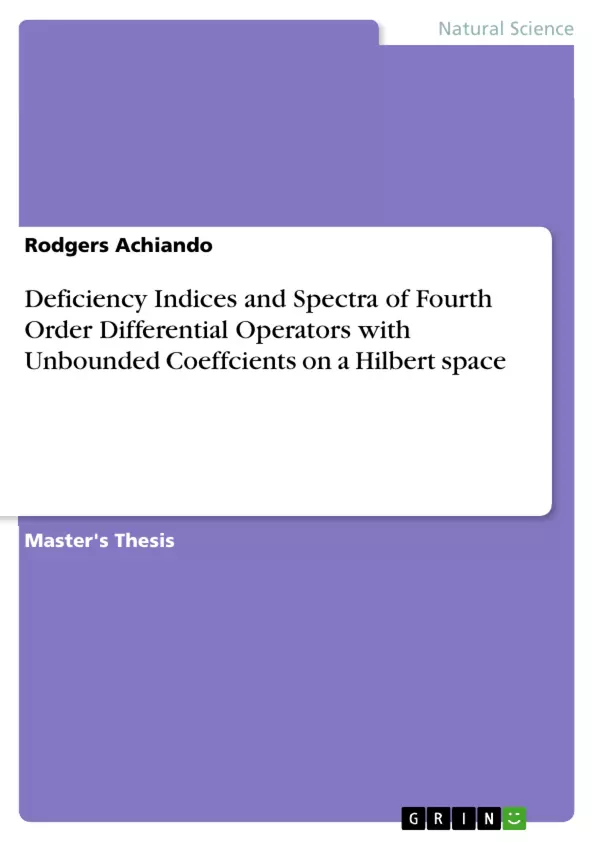In this thesis, using asymptotic integration, we have investigated the asymptotic of the eigensolutions and the deficiency indices of fourth order differential operators with unbounded coefficients as well as the location of absolutely continuous spectrum of self-adjoint extension operators.
We have mainly endeavored to compute eigenvalues of fourth order differential operators when the coefficients are unbounded, determine the deficiency indices of such differential operator and the location of the absolutely continuous spectrum of the self-adjoint extension operator together with their spectral multiplicity. Results obtained for deficiency indices were in the range (2, 2) ≤ defT ≤ (4, 4) under different growth and decay conditions of co-efficients.
The concept of unbounded operators provides an abstract framework for dealing with differential operators and unbounded observable such as in quantum mechanics. The theory of unbounded operators was developed by John Von Neumann in the late 1920s and early 1930s in an effort to solve problems related to quantum mechanics and other physical observables. This has provided the background on which other scholars have developed their work in differential operators. Higher order differential operators as defined on Hilbert spaces have received much attention though there still lays the problem of computing the eigenvalues of these higher order operators when the coefficients are unbounded.
Inhaltsverzeichnis (Table of Contents)
- INTRODUCTION
- Background of the study
- Basic Concepts
- Statement of the problem
- Objective of the study
- Significance of the study
- Research methodology
- LITERATURE REVIEW
- ASYMPTOTIC INTEGRATION
- Hamiltonian system
- Asymptotic Integration
- Eigenvalues of C(x)
- Dichotomy condition
- Diagonalisation
- DEFICIENCY INDICES AND SPECTRA
- Deficiency Index
- CONCLUSION AND RECOMMENDATION
- Conclusion
- Recommendation
Zielsetzung und Themenschwerpunkte (Objectives and Key Themes)
This thesis explores the asymptotic behavior of eigensolutions and deficiency indices of fourth-order differential operators with unbounded coefficients. The primary objective is to determine the eigenvalues, deficiency indices, and the location of the absolutely continuous spectrum of self-adjoint extension operators associated with these operators.
- Asymptotic analysis of eigensolutions
- Deficiency indices of fourth-order differential operators
- Absolutely continuous spectrum of self-adjoint extensions
- Impact of unbounded coefficients on operator properties
- Application of asymptotic integration techniques
Zusammenfassung der Kapitel (Chapter Summaries)
- Chapter 1: INTRODUCTION This chapter introduces the concept of unbounded operators and their relevance in quantum mechanics and other fields. It outlines the problem, objectives, significance, and research methodology of the study.
- Chapter 2: LITERATURE REVIEW This chapter reviews existing literature related to the topic, providing a foundation for the research undertaken in the thesis.
- Chapter 3: ASYMPTOTIC INTEGRATION This chapter delves into the concepts of Hamiltonian systems, asymptotic integration, eigenvalues, and the dichotomy condition. It also discusses the process of diagonalization within this framework.
- Chapter 4: DEFICIENCY INDICES AND SPECTRA This chapter focuses on the concept of deficiency indices and their relationship to the spectral properties of the studied differential operators.
Schlüsselwörter (Keywords)
The key focus of this thesis lies in the analysis of fourth-order differential operators with unbounded coefficients, exploring their asymptotic behavior, deficiency indices, and spectral properties. Key concepts include asymptotic integration, deficiency indices, absolutely continuous spectrum, self-adjoint extensions, and Hamiltonian systems.
Frequently Asked Questions
What is the main focus of this mathematics thesis?
The thesis investigates the asymptotic behavior of eigensolutions and the deficiency indices of fourth-order differential operators with unbounded coefficients, particularly on Hilbert spaces.
What are deficiency indices in differential operator theory?
Deficiency indices are a pair of numbers that help determine whether a symmetric operator has self-adjoint extensions. In this study, they were found to range between (2, 2) and (4, 4) depending on coefficient conditions.
How does the study handle unbounded coefficients?
Using asymptotic integration and Hamiltonian systems, the author analyzes how the growth and decay conditions of these coefficients affect the eigenvalues and the spectrum of the operator.
What is the significance of the absolutely continuous spectrum?
The location and multiplicity of the absolutely continuous spectrum are vital for understanding the physical observables in quantum mechanics, which the theory of unbounded operators aims to model.
Who developed the foundational theory for this work?
The theory of unbounded operators was primarily developed by John von Neumann in the late 1920s to solve problems in quantum mechanics.
What research methodology was applied?
The thesis utilizes asymptotic integration techniques, diagonalization, and the dichotomy condition to explore the properties of higher-order differential operators.
- Quote paper
- Rodgers Achiando (Author), 2016, Deficiency Indices and Spectra of Fourth Order Differential Operators with Unbounded Coeffcients on a Hilbert space, Munich, GRIN Verlag, https://www.grin.com/document/376969



